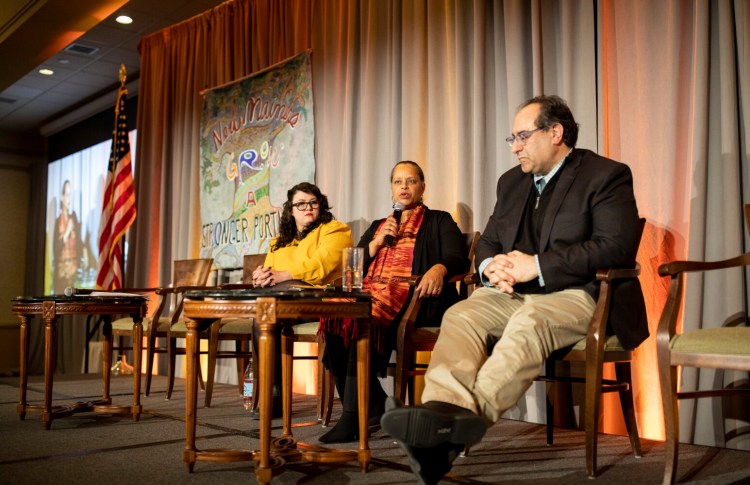Portland’s 39th annual Martin Luther King Jr. celebration delivered some hard history lessons and repeated calls for action to the 735 people who attended the dinner at the Holiday Inn by the Bay on Monday night.
One speaker laying out the uncomfortable truths was Kate McMahon-Ruddick, a graduate of the University of Southern Maine who is a museum specialist with the Center for the Study of Global Slavery at the Smithsonian National Museum of African American History & Culture.
Though Maine was a free territory before separating from Massachusetts and a free state afterward, ships built and financed by Maine companies carried thousands of enslaved people before the Civil War, McMahon-Ruddick said.
Nathaniel Gordon, a sea captain from Portland, is the only slave trader in U.S. history to be convicted and hanged for his crimes – after his ship was captured in 1860 on the Congo River, on its way to Cuba, carrying nearly 900 African men, women and children.
And throughout Maine’s 200-year history, its own indigenous tribes and people of color have been marginalized and persecuted under racist laws rooted in white supremacy.
“Maine is a myth that began to take shape 200 years ago,” McMahon-Ruddick said. “What does it mean to be a Mainer on land stolen from Wabanaki tribes? … We must begin to teach this history to Maine students.”
McMahon-Ruddick delivered the opening history lesson along with Darren Ranco, a member of the Penobscot Indian Nation and chairman of Native American programs at the University of Maine.
State Rep. Rachel Talbot Ross, D-Portland, lead organizer of the MLK dinner, opened the evening with a moment of silence for all people whose lives have been marred or taken by violence.

Isabelle Carter, center, listens as Darren Ranco speaks about the history of the Wabanaki people in Maine at Monday night’s Martin Luther King Day dinner. Brianna Soukup/Staff Photographer Buy this Photo
For the first time, the dinner had no head table for political dignitaries this year and instead had panel discussions based on King’s fourth and final published book, “Where Do We Go From Here: Chaos or Community?”
Speakers examined the meaning of race, tribal sovereignty and the struggle for self-determination since Maine became a state in 1820. And they called for “historical recovery” that would produce a more inclusive and equitable Maine for the next 200 years.
Chief Kirk Francis, head of the Penobscot Indian Nation, announced a legislative effort to restore rights to Wabanaki tribes after centuries of oppression.
“We’re not going anywhere,” Francis said. “We want to be good neighbors and we want you to be good neighbors.”
Alison Beyea, executive director of ACLU Maine, called for criminal justice reform to address disparities in the way minorities are treated. Xavier Botana, superintendent of Portland public schools, highlighted the success gap reflected in standardized testing that affects many students of color.
Rep. Chellie Pingree, D-1st District, shared her thoughts on what’s happening in Washington, D.C., saying “the worst administration in our lifetimes” is “turning back the clock on racial, social and economic justice.”

More than 700 people gather at the Holiday Inn by the Bay on Monday night for Portland’s 39th annual Martin Luther King dinner. Brianna Soukup/Staff Photographer Buy this Photo
State Rep. Craig Hickman, D-Winthrop, said he met with Portland-area students Monday afternoon and was dismayed to hear “harrowing” descriptions of racial profiling by teachers and administrators.
Hickman was the main sponsor of legislation passed last year that prohibits bias-based profiling by law enforcement. In particular, it bans traffic stops, detentions, searches, or asset seizures and forfeitures based on race, ethnicity, sexual orientation and other biases.
“If you’ve never been profiled, you don’t know how humiliating it is,” Hickman said before delivering his slam-winning poem, “Field Trip,” which recalls the experience of being profiled by a museum guard.
Speakers who called for a reckoning with Maine’s racial history included Abdul Ali, artistic director of Maine Youth Justice, Crystal Cron, president of Presente! Maine, and Maryama Mohamud, founding head of Somali Mainers Youth Network.
Grace Valenzuela, who heads the multilingual program in Portland schools, said it’s hard to be optimistic about the future when structural inequities are built into the system.
Valenzuela said knowing history is key to recognizing how the governments of the United States and Maine have deceived and controlled the disenfranchised at home and abroad through the centuries.
“Let Maine be the state where every child, every adult, has a true understanding of history,” Valenzuela said.
Send questions/comments to the editors.



Success. Please wait for the page to reload. If the page does not reload within 5 seconds, please refresh the page.
Enter your email and password to access comments.
Hi, to comment on stories you must . This profile is in addition to your subscription and website login.
Already have a commenting profile? .
Invalid username/password.
Please check your email to confirm and complete your registration.
Only subscribers are eligible to post comments. Please subscribe or login first for digital access. Here’s why.
Use the form below to reset your password. When you've submitted your account email, we will send an email with a reset code.